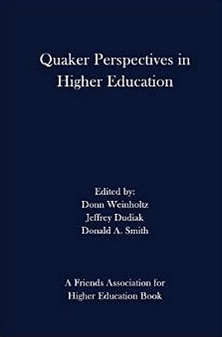Quaker Perspectives in Higher Education
Reviewed by Michael S. Glaser
June 1, 2015
 Edited by Donn Weinholtz, Jeffrey Dudiak, and Donald A. Smith. Friends Association for Higher Education, 2014. 293 pages. $19.95/paperback; $9.95/eBook.
Edited by Donn Weinholtz, Jeffrey Dudiak, and Donald A. Smith. Friends Association for Higher Education, 2014. 293 pages. $19.95/paperback; $9.95/eBook.
Buy on FJ Amazon Store
Quaker Perspectives in Higher Education offers a diverse and often disparate collection of essays that left me reinvigorated, thinking about what has gone missing from higher education: a sense of genuine purpose, values, and commitment to the growth of the whole person—all buried under “the normalized logics of the market and the military” and favoring vocational preparation and financial reward over nurturing the life of the mind and the life of the spirit.
Perhaps because I come to this book from almost 50 years in a liberal arts setting, it seems to me that many of these essays focus on not only what is “the distinctively Quaker vision of higher education,” but also the core liberal arts and Socratic question “What is the life worth living?” Certainly, this book opens up space to ask penetrating questions about what higher education in general can and perhaps should be. This is particularly true for undergraduate liberal arts education, though I think there is great value here for high school educators as well.
The essays in this book encourage teachers to slow down from the whirring pace that is too often focused on testing and preparation for the job market and remember, as Jay Roberts reminds us, that Rachel Carson wisely cautioned “Before we think whether we can do something, we ought to think whether we should.”
Roberts’s essay, “Quakers and the Question of Sustainability,” sets the stage for looking at some essential premises of the Quaker approach to education as he reminds us (in Henry Giroux’s phrase) that “the pedagogical is political” and that, despite the claims of some professorial pundits, there is no such thing as “neutrality” in content or method. Indeed, the assumptions that have been imbedded within the larger economic world view have been guiding most educational institutions for much of the last half century. Roberts also reminds us that our often frenetic lives as teachers not only keep us from finding time for wonder and curiosity, but also, like it or not, serve as models to our students of the “life worth living.”
There are 38 short essays in this collection, and many make for absorbing and challenging reading. Among others, a few, like the Roberts essay are, I believe, exceptional and deserve mention: Lonnie Valentine discusses “The Challenge of Liberation Pedagogy” and the realities of class, privilege, and oppression that are systemic in higher education. She urges us to have the courage to explore the hidden and unexamined assumptions that underlie so many of our curricular goals, while Julie Meadows urges that we examine the elitism that so often comes with the fiscal exclusivity of most liberal arts institutions. Jay Case encourages teachers to move beyond old notions about what students are thinking, feeling, and wanting so that we can genuinely understand and engage them; and Laura Rediehs and Steve Smith both offer insightful understandings about college writing and invite teachers to think about the style of writing they ask for and expect.
An important takeaway from these and other essays is that we have an urgent need to examine our assumptions about teaching and learning as well as the values that are ingrained in the courses and curriculums we teach. The essays offer a powerful reminder that most of us have done too good a job of adjusting to the world we live in and that it might be wise to encourage more “creative maladjustment” if, as Steve Chase points out, we are ever going to create our sought-after versions of the beloved community.
I’d encourage anyone interested in higher education to read this book and to make it a part of their local teaching and learning resource center. Quaker Perspectives in Higher Education is filled with challenging and thoughtful ideas for both the individual teacher and those interested in curricular development.
I leave this book feeling grateful and wanting to share many of the essays and ideas with my own colleagues as tools for reimaging and re-envisioning the teaching-learning process in order to make it more relevant and meaningful for not just our students, but also many of the hungers of the world in which we live.



Comments on Friendsjournal.org may be used in the Forum of the print magazine and may be edited for length and clarity.